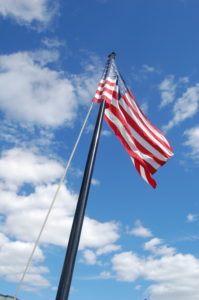As America haltingly formed, first organized under the Articles of Confederation and then with that great achievement the Constitution, there arose the worst nightmare of those founding fathers-“faction.” Very early on, the scene was set. The faction known as the Republicans as led by Thomas Jefferson squared off against the Federalists whose standard bearer was Alexander Hamilton. From the time the former was named Secretary of State and the latter was named Secretary of the Treasury under George Washington, the scene was set for American history’s most vituperative confrontation, between factions and philosophies represented by two of the great men in history.
The conflict, which traces its beginning from the time that these two brilliant fighters took opposing offices under Washington, famously led to the death of Hamilton at the hands of the Republican Aaron Burr. During the time between the two secretaries took office and Hamilton’s death the printing presses of the day were filled with personal enmity that set a high standard for America’s politicians for the next two hundred hears and beyond. As Hamilton told Rufus King, “The political putrefaction of Pennsylvania is greater than I had any idea of.”
The passionate anger of those days could not have been more damaging to the development of the American government without causing an irreparable split between the states along a north/south axis based on the apparently opposing views of the partisans. Jefferson’s view of an agrarian society based on his vision of a farm economy clashed with the urban Hamiltonian view which set a hegemonic view of urban growth through commerce and industry.
There were numerous fault lines between these two groups. Hamilton was accused of monarchist views he did not hold. He viewed an economically strong central government as decisive to American growth, power, and safety. Keep in mind that at the beginning of their conflict America had no foreign reserves and was deeply in debt. Hamilton hit the ground running before Jefferson was able to return from France, and through a lifelong work ethic that had no equal in his day, was able to establish policies that set the new countries economy humming and made Hamilton popular.
Another fissure formed when Jefferson returned from France. His advocacy on behalf of French Hegemony clashed with the views of Hamilton who believed that, England, as the greatest economic power of the day, should continue its relationship with the United States, minus the odious taxes and unrepresentative control occurring during the colonial days. In Hamilton’s view, the most logical trading relationship should be with the country that was previously the dominant trading partner. The sentimental views derived from the support the French had given the colonies in their struggle against the British.
Early America was not only beset by north/south divisions, but also suffered an east/west fracture that split the young country. To some extent, this represented an urban/rural divide. Hamilton’s Whiskey Tax further alienated these factions and culminated in the Whiskey Rebellion which was put down by George Washington with a minimum of casualties.
Hamilton also took many hits, both personal and public. As the illegitimate son of a woman of dubious character, he battled demons his entire life. Affable in person, he was sensitive to slights and was quick to challenge an opponent who questioned his integrity and honor. Before his final dueling death he had several near misses with opponents who reconciled with him, perhaps realizing that Hamilton was not running a bluff.
The divisions in the American body politic ran deep and hard and did not abate after Hamilton’s death. The Constitution’s provisions did not deal with the issue of slavery. Hamilton was, perhaps, the leading abolitionist of his day, Jefferson a holder of over one hundred slaves. As is known today, the death of hundreds of thousands of Americans during the civil war seemed to have inevitability about it.
As America seeks to come to grips with the candidacy of Donald Trump and Hillary Clinton, there is a sense here that the level of personal conflict and policy have been seen somewhere before. It does not matter that the current candidates are as small as Lilliputians tying down a great country with their vanity and failings. Nor is it a comfort that the country survived the split between greater men, Hamilton and Jefferson, as well as a crushing civil war. There is no guarantee that civilization will proceed over any bump. Anthropologists believe a South American Indian culture collapsed after it ran out of lime to make the structures they built. An economy is not inevitable, either. Sometimes it doesn’t take much. The apocalyptic view has been wrong in the past, but past performance is not an indicator of future results.
More on this later . . .

